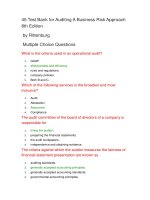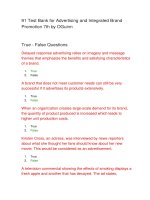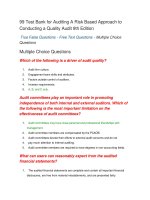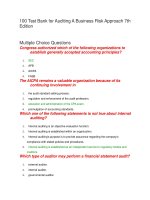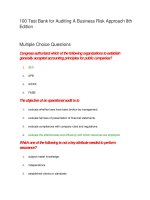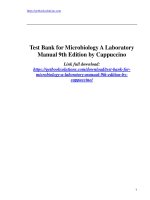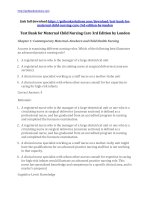Test bank for pharmacology a nursing process approach 7th by kee
Bạn đang xem bản rút gọn của tài liệu. Xem và tải ngay bản đầy đủ của tài liệu tại đây (221.62 KB, 6 trang )
Pharmacology A Nursing Process Approach 7th Edition –
Kee
Pharmacology A Nursing Process Approach 7th Edition – Kee
Link download full: />Sample
Kee: Pharmacology, 7th Edition Chapter 4: Medication Administration
Test Bank MULTIPLE CHOICE
1. The nurse is preparing to administer an intramuscular injection to an infant. What is the most
accurate site for the nurse to select for this administration?
a. Ventrogluteal
b. Vastus lateralis
c. Dorsogluteal d. Deltoid
ANS: B
The vastus lateralis is the most appropriate site to utilize for an IM injection in an infant.
DIF: Cognitive Level: Comprehension REF: p. 44
TOP: Nursing Process: Intervention/Implementation
MSC: CONTENTCATEGORY:PhysiologicalIntegrity:Pharmacologicaland Parenteral Therapies
2. What is an appropriate nursing intervention to use to meet the psychiatric needs of a
hospitalized infant?
a. Move slowly while conducting care.
b. Explain procedures carefully.
c. Use the oral route for medications. d. Allow the child to express feelings.
ANS: A
The nurse should move slowly and maintain a nonthreatening attitude in order to prevent
stranger anxiety from developing in the infant.
DIF: Cognitive Level: Application REF: p. 45
TOP: Nursing Process: Intervention/Implementation
MSC: CONTENTCATEGORY:PhysiologicalIntegrity:Pharmacologicaland Parenteral Therapies
3. During administration of eye drops, the nurse should teach the client to prevent systemic
absorption of the drug by performing which action?
a. Use the ointment form of the drug.
b. Apply the drug directly on the cornea.
c. Have the client look straight ahead. d. Gently press on the lacrimal duct.
ANS: D
Copyright © 2012, 2009, 2006, 2003 by Saunders, an imprint of Elsevier Inc.
Test Bank 4-2
By applying pressure on the inner canthus of the eye, the medication is less likely to be
systemically absorbed.
DIF: Cognitive Level: Application REF: p. 37
TOP: Nursing Process: Intervention/Implementation
MSC: CONTENTCATEGORY:PhysiologicalIntegrity:Pharmacologicaland Parenteral Therapies
4. A nurse is preparing to administer a deep IM injection to a client. Which site is suited for a
deep IM injection?
a. Abdomen
b. Dorsogluteal
c. Deltoid
d. Vastus lateralis
ANS: B
The dorsogluteal site is suited for deep IM or Z-track injections.
DIF: Cognitive Level: Comprehension REF: p. 44
TOP: Nursing Process: Intervention/Implementation
MSC: CONTENTCATEGORY:PhysiologicalIntegrity:Pharmacologicaland Parenteral Therapies
5. A nurse administers an injection using the Z-track method. The nurse instructs the patient that
the Z-track technique is designed to accomplish what?
a. Allow the client to accept at least 5 mL of medication.
b. Prevent medication from leaking into subcutaneous tissue.
c. Decrease the possibility of “self-sticks.” d. Take less time to administer.
ANS: B
The Z-track method displaces the tissue during medication injection and replaces the tissue when
withdrawn. This prevents leaking.
DIF: Cognitive Level: Comprehension REF: p. 44
TOP: Nursing Process: Intervention/Implementation
MSC: CONTENTCATEGORY:PhysiologicalIntegrity:Pharmacologicaland Parenteral Therapies
6. A nurse is applying nitroglycerin ointment to a client. When applying medication topically,
what is the highest priority nursing intervention?
a. Apply medication liberally.
b. Avoid contact of the medication with the nurse’s skin.
c. Massage the area.
d. Have client apply medication.
ANS: B
Copyright © 2012, 2009, 2006, 2003 by Saunders, an imprint of Elsevier Inc.
Test Bank 4-3
Because this medication is topically absorbed, contact with the nurse’s skin may cause the nurse
to feel the effects of the medication.
DIF: Cognitive Level: Application REF: p. 37
TOP: Nursing Process: Intervention/Implementation
MSC: CONTENTCATEGORY:PhysiologicalIntegrity:Pharmacologicaland Parenteral Therapies
7. A nurse prepares to administer an ear medication to a 2-year-old child. What is the correct
action by the nurse?
a. Position the child with the ear down on the bed.
b. Pull the ear upward and backward.
c. Put the child in high-Fowler’s position. d. Pull the ear downward and backward.
ANS: D
This is the correct method for a child younger than 3 years. For a child older than 3 years, the ear
is pulled up and back.
DIF: Cognitive Level: Application REF: p. 38
TOP: Nursing Process: Intervention/Implementation
MSC: CONTENTCATEGORY:PhysiologicalIntegrity:Pharmacologicaland Parenteral Therapies
8. The nurse is teaching the client how to administer a sublingual tablet in the home setting.
What is the highest priority instruction?
a. Take nothing by mouth for one hour before taking the medication.
b. Avoid taking fluid with the medication.
c. Gently place the tablet between the teeth and gums.
d. Take the medication with food so as to avoid gastrointestinal irritation.
ANS: B
Food and fluids should be avoided when taking a sublingual tablet to avoid moving the tablet
from under the sublingual region.
DIF: Cognitive Level: Application REF: p. 36
TOP: Nursing Process: Intervention/Implementation
MSC: CONTENTCATEGORY:PhysiologicalIntegrity:Pharmacologicaland Parenteral Therapies
9. A client has been using his inhaler at home. He tells the nurse that “the medication doesn’t
seem to work as well as it did.” What should the nurse assess for first?
a. Tolerance to the medication
b. Unhealthy drug-seeking behaviors
c. Physical addiction
d. Poor tolerance of pain
ANS: A
Overuse of the medication can lead to the development of tolerance.
Copyright © 2012, 2009, 2006, 2003 by Saunders, an imprint of Elsevier Inc.
Test Bank 4-4
DIF: Cognitive Level: Analysis REF: p. 40
TOP: Nursing Process: Assessment
MSC: CONTENTCATEGORY:PhysiologicalIntegrity:Pharmacologicaland Parenteral Therapies
10. A client with chronic angina is ordered to receive nitroglycerin via patch. What is the highest
priority nursing action regarding this method of administration?
a. Cut the patch to provide the correct dose of medication.
b. Use sterile technique when applying the patch.
c. Remove the old patch before applying the new patch.
d. Cover the patch with an airtight dressing after application.
ANS: C
The old patch must be removed before the new patch is applied in order to prevent overdosing
the client and also to prevent irritation to the skin.
DIF: Cognitive Level: Application REF: pp. 36-37
TOP: Nursing Process: Intervention/Implementation
MSC: CONTENTCATEGORY:PhysiologicalIntegrity:Pharmacologicaland Parenteral Therapies
11. A nurse is administering an intradermal PPD to test for client exposure to the tuberculosis
bacterium. Which method is the correct one for administering this injection?
a. Use a 5-degree angle to insert a 20-gauge needle.
b. Use a 10-degree angle to insert a 25-gauge needle.
c. Use a 45-degree angle to insert a 26-gauge needle. d. Use a 90-degree angle to insert an 18gauge needle.
ANS: B
This is the correct procedure for an intradermal injection.
DIF: Cognitive Level: Analysis REF: p. 41
TOP: Nursing Process: Intervention/Implementation
MSC: CONTENTCATEGORY:PhysiologicalIntegrity:Pharmacologicaland Parenteral Therapies
12. A client returns to the nursing unit from conscious sedation after having a fracture set and
placed in a cast. The client expresses pain 3 hours after the procedure. The choice of medication
and route will be based on which information?
a. The client should not receive pain medication because of his previous sedation.
2. The client will need to void before receiving any pain medication in order to avoid
urinary retention.
3. The client should receive intravenous medication only for pain because of the operative
procedure.
4. The client’s ability to swallow should be evaluated before he or she receives oral
medication.
Copyright © 2012, 2009, 2006, 2003 by Saunders, an imprint of Elsevier Inc.
Test Bank 4-5
ANS: D
Before providing oral medication, it is essential for the nurse to evaluate the client’s level of
consciousness and ability to swallow.
DIF: Cognitive Level: Analysis REF: p. 36
TOP: Nursing Process: Analysis
MSC: CONTENTCATEGORY:PhysiologicalIntegrity:Pharmacologicaland Parenteral Therapies
13. The nurse is preparing to administer a subcutaneous injection of morphine sulfate (MSO4) to
a client. The client’s height, weight, and muscle mass are within normal limits. What are the
appropriate needle size and angle for this injection?
a. 27-gauge needle, 10-degree angle
b. 20-gauge needle, 90-degree angle c. 23-gauge needle, 20-degree angle d. 25-gauge needle, 45degree angle
ANS: D
This is the correct angle and size for a subcutaneous injection.
DIF: Cognitive Level: Application REF: pp. 41-42
TOP: Nursing Process: Intervention
MSC: CONTENTCATEGORY:PhysiologicalIntegrity:Pharmacologicaland Parenteral Therapies
MULTIPLE RESPONSE
1. The nurse is preparing to administer an ointment to the client’s eye and is gathering the needed
supplies. What supplies are needed to complete this task? (Select all that apply.) a. Clean gloves
b. Medication ointment
c. Sterile gauze d. Sterile gloves e. 30-mL syringe f. 5-mLsyringe g. Tissues
ANS: A, B, C, G
Although the eyes are considered sterile, clean gloves are all that are needed, and care should be
taken to keep the medication sterile. The syringes are not needed. The sterile gauze is needed in
case the eye must be touched. The tissues allow for removal of excess medication.
